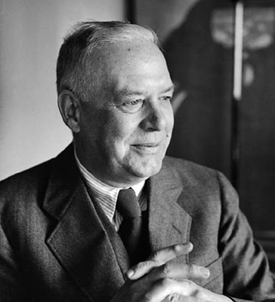|
Wallace Stevens A Brief History of Sluggish LinesBy Jon Baldwin It might be thought that an axiom of poetry be that sluggish lines are avoided. They bear witness to a crisis: the poem is stilted and stunted. Like the slug itself (this snail without even a shell) something slow is happening: the slug’s time is out of joint. Attention should not, we might think, be drawn to sluggish lines. If this initial hypothesis is allowed then it makes Wallace Stevens’s explicit title announcement in "Long and Sluggish Lines" worthy of consideration. Here is the poem:
Long and Sluggish Lines
It makes so little difference, at so much more
Wood-smoke rises through trees, is caught in an upper flow
The trees have a look as if they bore sad names
In a kind of uproar, because an opposite, a contradiction,
What opposite? Could it be that yellow patch, the side
Or these-escent-issant pre-personae: first fly,
Babyishness of forsythia, a snatch of belief,
…Wanderer, this is the pre-history of February.
You were not born yet when the trees were crystal
In the first third of this ‘late’ poem we find the aged Stevens “so much more than seventy” (lines 1-2), having already seen it all: “where one looks, one has been there before” (line 2). Smoke plays the trees, but this is merely banal repetition: “it has often been so” (line 4). The trees keep “saying over and over one same thing, same thing” (line 6). These are the long and sluggish lines of the title. Thus far philosopher Simon Critchley’s reading of Stevens’s late work is apt: “what Stevens is about in these late poems is what we might call the poetry of the antipodes of poetry. It is a sort of anti-poetry.” (Critchley 2005: 73) In "Long and Sluggish Lines," opines Critchley, “life is empty repetition” (Critchley 2005: 76). The poet “begins to doubt himself and undo what he has done in his art” (Critchley 2005: 76). Further, “Stevens is about as close as one can get to giving up verse in verse” (Critchley 2005: 81). Sluggish lines are one such poetic undoing, one such form of giving up and giving in. Yes, and yet.
Critchley is interested in Stevens as “the philosophically most interesting poet to have written in English in the twentieth century” (Critchley 2005: 15); who produces a form of ‘poetic epistemology’ (Critchley 2005: 30); and whose work is torn between two temptations: “between imagination reducing reality to itself and reality reducing the imagination’s power to impotence” (Critchley 2005: 85). Judged within this scheme, of an oscillation between idealism and realism, “Stevens’s poetry fails” (Critchley 2005: 87). Yes, and yet “maybe all modern poetry fails” (Critchley 2005: 87): “it is clear that the passage from ancient to modern poetry occurs when the theatre becomes a ruin, a ruin in which we moderns sit.” (Critchley 2005: 36) Poetry as the enchantment of the world, “the incantation of reality under the spell of imagination” (Critchley 2005: 58), poetry as “a sort of sorcery” (Critchley 2005: 58), today lacks something. This something might be the virtue of nobility. The ancient Longinus claims that “Sublimity [or excellence of expression, or grandeur] is the echo of a noble mind” (Longinus 1965: 109). Stevens, in an essay, argues “There is no element more conspicuously absent from contemporary poetry than nobility.” (Stevens 1960: 35) This idea of poetry as the ennobling of things through words is what Stevens terms the “supreme use of language” (Stevens 1960: 19). Sluggish lines, it is clear, lack such nobility.
The first third of "Long and Sluggish Lines" adheres to Critchley’s thesis and is consistent with Stevens’s poetic anti-poetry. However, then something else happens. The contradiction between, in this instance, the trees and a yellow patch on the side of a house (lines 7–10) might be thought of as the manifestation of a dialectical struggle between a thesis (the ancient) and antithesis (the modern). This yields a spark of poetic synthesis. The contradiction marks the move from repetitive realism to a new idealism. The arrival of the new disturbs the poet’s repetition. That without previous identity has arrived: the “pre-personae” (line 11). The interruption of the new, of the other, disrupts the same old same. The old slug, it seems, is plucked by the young bird. In the ancient ruins of the theatre that is playing Stevens, what emerges is not tragic repetition but, in this case, comedy of the new: “A comic infanta among the tragic drapings. Babyishness of forsythia” (lines 12-13). What sparks this poetic turn around, set up so well by the initial sluggish lines? It seems to be the “snatch of belief” (line 13), the uncanny “spook” of the “nude magnolia” (line 14): the very otherness of the world, the wonder of the new, ennobled by the poet. The poem ends with a wonderful evocation of our idealism within realism: our “wakefulness inside a sleep” (line 18).
Two notes by way of concluding this brief follow in the trail of sluggish lines. The poetic line itself might be considered as a leap of faith; without a ‘snatch of belief’ and nobility, it can end in sluggish failure. Stevens’s poem draws attention to a reversal. The very reversal of the initial sluggish and repetitive lines refutes the early hypothesis that sluggish lines serve little benefit. They may best be thought of, and utilised, as an antithesis that the poetic can resolve.
Bibliography
Critchley, Simon. Things Merely Are: Philosophy in the Poetry of Wallace Stevens (Routledge, London, 2005).
Longinus. "On The Sublime." In Classical Literary Criticism (T.S. Dorsch (ed.) Penguin Books, Middlesex England, 1965)
Stevens, Wallace. Collected Poems (Vintage Books, New York, 1954).
Stevens, Wallace. The Necessary Angel: Essays on Reality and the
Imagination (Faber, London, 1960).
|
